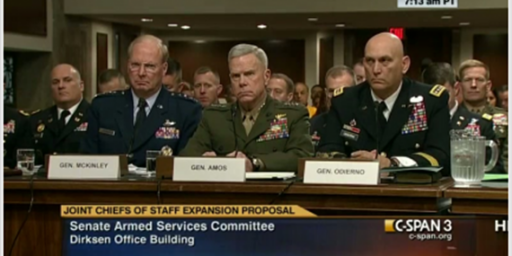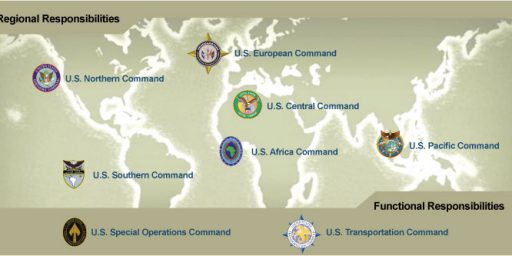CLARK IN KOSOVO
Jeffrey Smith has an excellent and detailed piece examining Wesley Clark’s leadership in the Kosovo operation in today’s WaPo. It paints a complicated picture of Clark, largely confirming what I’ve read elsewhere, and also sheds some light on Clark’s contentious relationship with then-JCS Chairman Hugh Shelton that helps explain Shelton’s bitter public assessment of Clark’s integrity.
Smith details Clark’s abrasive leadership style and unwillingness to defer to the chain of command–and tendency to go around them when it suited his purposes. This is not usually a desirable trait in a military officer, although I have mixed feelings about it in this case. Clark’s contention that his dual-hat status as NATO commander and CINCEUR gave him divided responsibilities and the need to talk directly to congressional leaders and the State Department is actually quite reasonable. Furthermore, the CINCs (now called “Combatant Commanders” per a Rumsfeld edict a couple years ago) actually don’t answer to the Joint Chiefs, as odd as that sounds. The JCS is primarily an administrative organization, they have no real command authority. They are, however, subordinate to the SECDEF.
Clark did apparently take his authority to the limit:
Not shying from confrontation, Clark said he pressed Army Chief of Staff Dennis J. Reimer, asking, “Do you want to fight a war anywhere?” There was a problem in Europe, he said later, “and it did not fit their model,” which envisioned major U.S. wars only in North Korea and the Persian Gulf area.
Albright, in an interview, said “it was very clear to me that the Pentagon did not want to move on this issue. . . . Wes and I thought it was worth doing.” A former Albright aide said Clark’s credentials lent critical ballast to Albright’s advocacy, providing cover for Clinton and White House officials who were loath to stand up to unified military opposition on any issue.
Retired Marine Gen. Anthony C. Zinni, the top U.S. commander for the Middle East while Clark commanded NATO, said, “There is always a tension between the CINCs [regional commanders in chief] and the service chiefs. The CINCs see the need for intervention, engagement, while the services control the resources and see this as a distraction.”
But Clark’s personal style evidently caused the policy dispute to boil over into a personal clash, according to former Joint Chiefs of Staff chairman John M. Shalikashvili, who appointed Clark to the NATO job over the objections of the Army leadership. Clark “is a guy who by temperament is more likely to operate on the edge of the system,” Shalikashvili said. The chiefs “might have felt that Wes pushed them too far.”
A former senior military official confirmed the account. “If Wes did not agree, then he thought it was okay to call . . . anyone else who would help,” the official said. “We don’t do that in the military.” Shelton was provoked, largely by Clark, to demand in a classified 1999 memo that all the regional CINCs inform him in advance of all their meetings in Washington.
James Steinberg, then the deputy national security adviser, said the White House would not have allowed Clark to conduct an end-run around the Pentagon. “I did not think he was being insubordinate,” Steinberg said. But “people who knew him understood that when he felt strongly, he wanted to let people know. . . . My perspective was that there was value in his giving his ground-truth.
Setting national grand strategy is outside the purview of the CINCs, who are supposed to merely carry out the policy set forth from above–the President and the SECDEF. But, again, the dual hat nature of Clark’s role as NATO commander makes it at least defensible.
I opposed the Kosovo intervention at the time and am still ambivalent at best about it even in hindsight. I don’t, however, mind Clark fighting for his convictions on this one. Clark is apparently especially abrasive and arrogant, even by the standards of four-star generals. That would be a major liability for a president, I think. Having the courage of his convictions, though, strikes me as a major asset. The problem I have with Clark is that, to the extent I can figure out what has convictions are, I tend not to share them.





Ah, don’t worry about it. He doesn’t have a snowball’s chance of winning the Presidency.
Yeah.. He’s got his convictions all right. He said that if
he was in congress he would have voted NES.
He was doing okay until he started talking.
I rather suspect some of his supporters have this fantasy of getting Clark nominated, and if, say, in mid-October there comes really bad news for Bush that plunges his poll numbers, Clark resigns from the ticket in favor of Hillary. Sort of a presidential-level Toricelli/Lautenberg switcheroo.
Hmm. Kind of makes the “I haven’t ruled her out as my running mate” comment a little less weird…
—